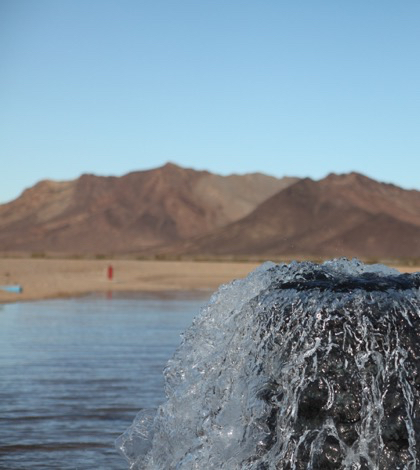Though the proposed Cadiz Water Project has repeatedly withstood numerous legal challenges to its Mojave Desert project, Senator Dianne Feinstein recently attempted to lob yet another attack on the Cadiz’s planned groundwater project that will deliver new water supplies from its property in San Bernardino County to 400,000 people in various Southern California cities.
The Cadiz Water Project has been extensively reviewed and analyzed under the California Environmental Quality Act (CEQA), commonly regarded as the toughest environmental law in the country. San Bernardino County has also independently regulated the project in accordance with its desert groundwater ordinance. And, the project has earned the support of various stakeholders, including the Laborers International Union, the California Chamber of Commerce (CalChamber), and the San Bernardino Farm Bureau.
The project weathered six lawsuits in 2013-14 and all claims were ultimately denied by the trial court. The petitioners appealed these judgments to the California Court of Appeal and, in May 2016, California’s Fourth District Court of Appeal sustained the six trial court decisions and validated the public agency environmental review and approvals of the project. The Appeals Court also upheld San Bernardino County’s approvals of the Project’s groundwater management plan, which will regulate its groundwater use.
Still, Sen. Feinstein issued a press release late last month that contends that, “For close to two decades, Cadiz has been trying to ram through a water extraction project that would harm the Mojave Desert. And now we hear from the Metropolitan Water District (MWD) that the water Cadiz wants to extract could contain dangerous chemicals that pose a threat to the safety of Southern California’s water supply.”
The Senator’s press release continues saying, “The water that Cadiz plans to extract contains numerous contaminants including arsenic and cancer-causing Chromium-6. Left untreated, it could pollute the pristine water of the Colorado River Aqueduct, endangering the health of not only Cadiz’s customers but all 19 million Californians who rely on that water.”
Cadiz responded to the Senator’s allegations noting that, “We are stunned and disappointed by the allegations made by Senator Feinstein, which reflect a lack of understanding of the Project and disregard for state requirements that all drinking water meet federal and state standards issued by the US Environmental Protection Agency and the State’s Division of Drinking Water. Her statement suggests that Cadiz water might be delivered to consumers without satisfying these standards; this is irresponsible and not true.
The statement continues noting that, “delivery of Cadiz groundwater to the CRA (Colorado River Aqueduct) will be done in full accordance with applicable federal and state standards. Cost-effective and permitted treatment technologies are available to reduce constituents below existing state and federal standards should such treatment be necessary in the future. Importantly, no water from Cadiz would ever enter the CRA that does not meet all local, state and federal standards and no water will reach consumers unless it satisfies these same standards.”
The Cadiz Water Project seeks to capture groundwater in California’s Fenner Valley that would otherwise rise to the surface and evaporate. Cadiz is a remote area with no industrial activity. The Cadiz area and its aquifer system, which Sen Feinstein describes in her press release as “pristine” and life-sustaining, is known to have water quality low in total dissolved solids, or salt content. Groundwater at Cadiz presently supports both domestic and agricultural uses without treatment.
Once the Cadiz water project is implemented, groundwater would be pumped on Cadiz’s properties and conveyed via a 43-mile buried pipeline to the Colorado River Aqueduct, owned and operated by the Metropolitan Water District of Southern California. The water would then later be distributed to Southern California communities in need of reliable water sources.
In a recent letter to Senator Feinstein, Metropolitan’s General Manger noted that Cadiz water is lower in total dissolved solids, than water in the Colorado River Aqueduct but higher in metals, such as arsenic and chromium. Cadiz contends that such constituents are naturally occurring and below current state and federal Maximum Contaminant Levels (MCLs) but is prepared to lower them prior to entering the aqueduct if required by MWD.
Cadiz has estimated that adding its water into the aqueduct may provide benefits to Metropolitan by reducing its total dissolved solids or salinity. According to the Southern California Salinity Coalition, high salinity impacts the region’s water users and distribution systems explaining on its website “when salinity levels of imported water are reduced, the region benefits from reduced costs to water consumers and utilities. A 100 milligram per liter (mg/L) salinity decrease in imported water would result in $95 million per year of economic benefits.”
According to Cadiz spokesperson Courtney Degener, the Project does not “yet have an application before Metropolitan to convey Cadiz water,” but expects participating agencies to begin discussing terms soon.
“The Project looks forward to reaching terms with Met and adding a new water supply opportunity for local agencies as soon as possible, “Degener added.
In July, Assembly member Laura Friedman (D-Glendale) introduced Assembly Bill 1000 – at the request of Sen. Feinstein — the California Desert Protection Act, a state bill that aimed to stop Cadiz by requiring new, additional reviews before groundwater could be conveyed in Metropolitan’s system.
The bill was blocked by the California Senate Appropriations Committee in September. In a statement issued following a hearing, Appropriations Committee Chairman State Senator Ricardo Lara (D-33rd District-Bell Gardens) said “California has the highest environmental review standards in the country and this particular project has gone through significant consideration and CEQA litigation. That process should be allowed to play out. Making an exception for one particular case will create precedent for the Legislature to block other controversial projects such as locally approved housing developments.”
 California Water News Daily Your Source For Water News in California
California Water News Daily Your Source For Water News in California


